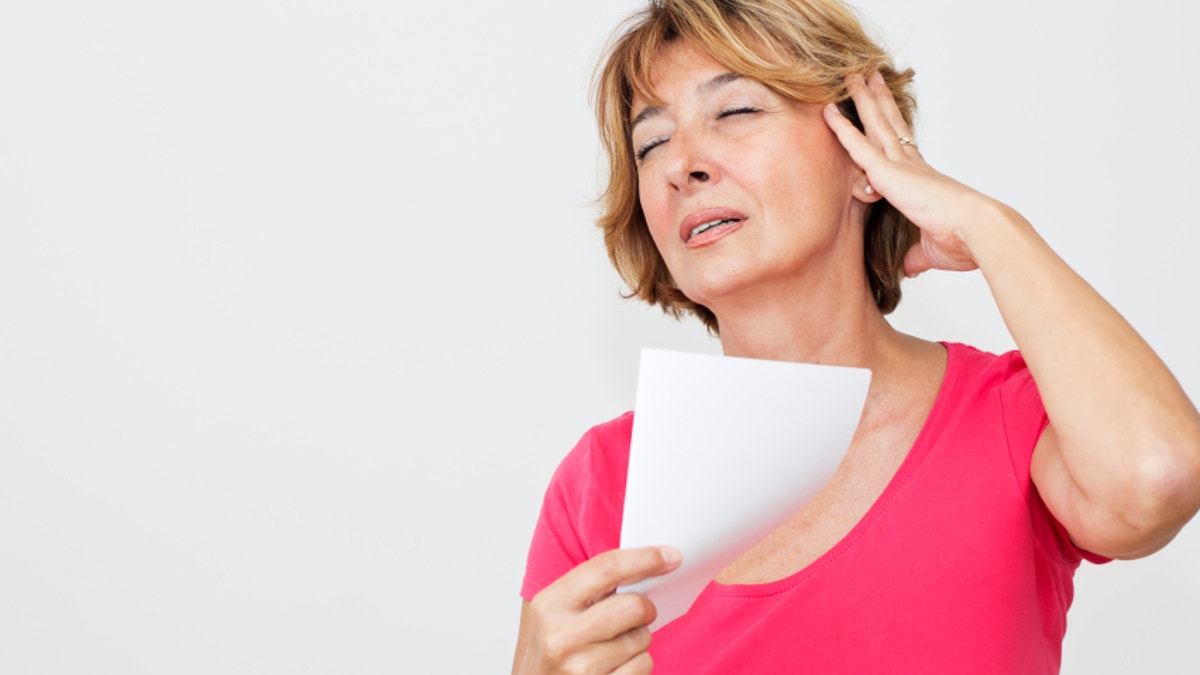
Woman cooling herself with a blank paper.
Managing menopausal symptoms like hot flashes may be possible without taking hormones, but the evidence supporting most alternatives is weak, European researchers say.
A multinational team analyzed past studies on treatments ranging from exercise to antidepressants and behavioral therapy, in a review conducted for the European Menopause and Andropause Society (EMAS).
Lead study author Gesthimani Mintziori, of the Aristotle University of Thessaloniki, Greece, told Reuters Health the group drafted the position paper on hormone alternatives because it could be confusing for women "to figure out what works best or what would work better for them.”
The review is meant to help doctors help their patients navigate the options. “In any case the choice of therapy should be the result of a joint decision-making procedure, together with their physician," he said in an email.
Hot flashes, night sweats and flushing are all included in the category of vasomotor symptoms, which are among the common – and bothersome - symptoms that women experience when going through menopause.
Hormone replacement therapy (HRT) usually involves a combination of estrogen and progestin, and has been shown to reduce hot flashes associated with natural menopause and menopausal symptoms linked to hormone-blocking drugs like Tamoxifen.
Doctors used to routinely prescribe hormone replacement therapy after menopause to relieve symptoms and also to lower the risk of heart disease. However, in 2002, a large U.S. trial called the Women's Health Initiative found that women using estrogen and progestin actually had a slightly higher risk of breast cancer, heart attack and blood clots. Although hormone therapy is the most effective remedy for hot flashes and other symptoms, many women stopped using it after those results were released.
Because many women do not want to take hormones, or cannot take them for medical reasons, the authors reviewed studies that assessed a wide range of alternatives - including gold-standard clinical trials, and smaller or observational studies covering lifestyle modifications, diet and food supplements, prescription medications and behavioral and alternative/complementary therapies.
The results were decidedly mixed, they report in the journal Maturitas.
For exercise, there was insufficient or conflicting evidence that it relieved hot flashes, but the researchers say it is worth trying because it could help improve overall quality of life and offset the increase in heart disease risk women face after menopause.
Evidence for supplements or a diet rich in phytoestrogens (such as soy) was also weak.
For selective serotonin-reuptake inhibitors (SSRIs) and serotonin norepinephrine-reuptake inhibitors (SNRIs), commonly used to treat depression and anxiety, there was evidence that they are effective in decreasing both the frequency and severity of hot flashes. Only paroxetine (Brisdelle) has been approved in the U.S. to treat hot flashes.
Gababentin, a drug used to treat some types of seizures and nerve pain, has also been studied as an alternative to hormone therapy, and some research has found it to be effective as well.
Finally, for behavioral interventions such as cognitive therapy, and alternative medical therapy such as acupuncture, the available evidence is still limited.
Dr. Wulf Utian, medical director for The North American Menopause Society, said he doesn't feel this is the definitive guideline for what works and what doesn't.
"There were a number of problems with the methodology of this paper," said Utian, who was not involved in the review. "And none of the papers they reviewed gave a level of evidence. There also isn't any algorithm for managing symptoms."
While the position paper pointed out that many of the non-hormonal interventions are not effective, he noted that "if there is one thing we know about hot flashes, there is a high placebo effect when it comes to treatment.” But, he said, “what difference does it make as long as it makes a woman feel better."
Utian added that while there isn’t a lot of evidence for many of the nonprescription interventions, they also tend not to have any side effects, like some of the drugs. "Women can try them out, and if it makes them feel better, then fine. If not, then they need to have a full discussion with their provider about hormones, which is really the most effective treatment."




















